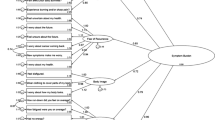Abstract
The short-form Cancer Needs Questionnaire (CNQ) is a self-administered cancer-specific questionnaire designed to assess patients' needs across several domains. The purpose of this study is to further evaluate its internal consistency and construct validity, in a group of ambulatory patients with cancer. Four hundred and fifty patients with a variety of cancer types participated. Factor analysis reproduced five domains: psychological; health information; physical and daily living; patient care and support; and interpersonal communication needs. Cronbach's α coefficients ranged from 0.94 to 0.77, indicating substantial consistency across items grouped in the five domains. A priori predictions regarding convergent and contrasting groups construct validity were explored using bivariate relationships between domains of the short-form CNQ, the EORTC QLQC-30 and Beck Depression Inventory (short-form), with support provided for most of the predictions. The current study provides supportive evidence that the short-form CNQ is a reliable and valid instrument for assessing the needs of patients with cancer in an ambulatory care setting.
Similar content being viewed by others
References
Australian Institute of Health and Welfare. Australia's health 2000: The seventh biennial health report of the Australian Institute of Health and Welfare. Canberra: Australian Institute of Health and Welfare, 2000.
Sprangers MAG, Aaronson NK. The role of health care providers and significant others in evaluating the quality of life of patients with chronic disease: A review. J Clin Epidemiol 1992; 45: 743–760.
Christ G, Siegel K. Monitoring quality-of-life needs of cancer patients. Cancer 1990; 65: 760–765.
Lattimore-Foot GG. Needs assessment in tertiary and secondary oncology practice: A conceptual and methodological exposition. Newcastle: University of Newcastle, 1996.
Bonevski B, Sanson-Fisher R, Girgis A, Burton L, Cook P, Boyes A, Group TSCR. Evaluation of an instrument to assess the needs of patients with cancer. Cancer 2000; 88: 217–225.
Sanson-Fisher R, Girgis A, Boyes A, Bonevski B, Burton L, Cook P, Group TSCR. The unmet supportive care needs of patients with cancer. Cancer 2000; 88: 226–237.
Girgis A, Boyes A, Sanson-Fisher R, Burrows S. Perceived needs of women diagnosed with breast cancer: Rural versus urban location. Aust NZJ Pub Health 2000; 24: 166–173.
Newell S, Sanson-Fisher R, Girgis A, Bonaventura A. How well do medical oncologists' perceptions reflect their patients' reported physical and psychosocial problems? Cancer 1998; 83: 1640–1651.
Bonevski B, Sanson-Fisher R, Hersey P, Paul C, Foot G. Assessing the perceived needs of patients attending an outpatient melanoma clinic. J Psychosoc Oncol 1999; 17: 101–118.
McLachlan S, Allenby A, Matthews J, et al. Randomized trial of coordinated psychosocial interventions based on patient self-assessments versus standard care to improve psychosocial functioning of patients with cancer. J Clin Oncol 2001; 19: 4117–4125.
Allenby A, Matthews J, Beresford J, McLachlan S. The application of computer touch-screen technology in screening for psychosocial distress in an ambulatory oncology setting. Eur J Cancer Care 2002; 11: 245–253.
Aaronson NK, Ahmedzai S, Bergman B, et al. for the European Organization for Research and Treatment of Cancer Study Group of Quality of Life. The European Organization for Research and Treatment of Cancer QLQC30: A quality-of-life instrument for use in international clinical trials in oncology. J Nat Cancer Inst, 1993; 85: 365–376.
Beck AT, Steer RA, Garbin MG. Psychometric properties of the Beck depression inventory: Twenty-five years of evaluation. Clin Psychol Rev 1988; 8: 77–100.
McLachlan S, Devins GM, Goodwin PJ. Validation of the European Organization for Research and Treatment of Cancer Quality of Life Questionnaire (QLQ-C30) as a measure of psychosocial function in breast cancer patients. Eur J Cancer Care 1998; 34: 510–517.
Osoba D, Zee B, Pater J, Warr D, Kaizer L, Latreille J. Psychometric properties and responsiveness of the EORTC Quality of Life Questionnaire (QLQ-C30) in patients with breast, ovarian and lung cancer. Qual Life Res 1994; 3.
Beck AT, Rial WY, Rickels K. Short form of depression inventory: Cross-validation. Psychol Rep 1974; 34: 1184–1186.
Hays RC, Anderson R, Revicki D. Psychometric considerations in evaluating health-related quality of life measures. Qual Life Res 1993; 2: 441–449.
Murphy KR, Davidshofer CO. Psychological Testing. Principles and Applications. 3rd ed. New Jersey: Prentice-Hall Inc. 1994.
Cohen J. A power primer. Psychol Bull 1992; 112: 155–159.
Tabachnick BG, Fidell LS. Using Multivariate Statistics. 3rd ed. Northridge: HarperCollins College Publishers 1996.
Luker KA, Beaver K, Leinster SJ, Owens RG, Degner LF, Sloan JA. The information needs of women newly diagnosed with breast cancer. J Adv Nursing 1995; 22: 134–141.
Ong LM, Visser MR, Lammes FB, vanDerVelden J, Kuenen BC, Dettaes JC. Effect of providing cancer patients with the audiotaped initial consultation on satisfaction, recall, and quality of life: A randomised, double-blind study. J Clin Oncol 2000; 18: 3052–3060.
Bilodeau BA, Degner LF. Information needs, sources of information, and decisional roles in women with breast cancer. Oncol Nursing Forum 1996; 23: 691–696.
Butow PN, Maclean M, Dunn SM, Tattersall MH, Boyer MJ. The dynamics of change: Cancer patients' preferences for involvement and support. Ann Oncol 1997; 8: 857–863.
Foot G, Sanson-Fisher R. Measuring the unmet needs of people living with cancer. Cancer Forum 1995; 19: 131–135.
Nunnally JC. Psychometric Theory. 2nd ed. New York: McGraw-Hill 1978.
Author information
Authors and Affiliations
Rights and permissions
About this article
Cite this article
Cossich, T., Schofield, P. & McLachlan, S. Validation of the cancer needs questionnaire (CNQ) short-form version in an ambulatory cancer setting. Qual Life Res 13, 1225–1233 (2004). https://doi.org/10.1023/B:QURE.0000037496.94640.d9
Issue Date:
DOI: https://doi.org/10.1023/B:QURE.0000037496.94640.d9




